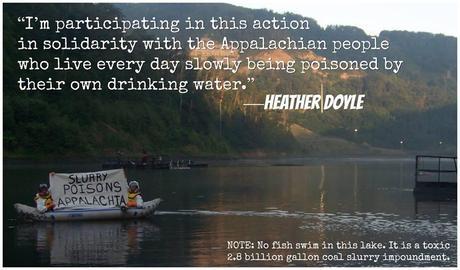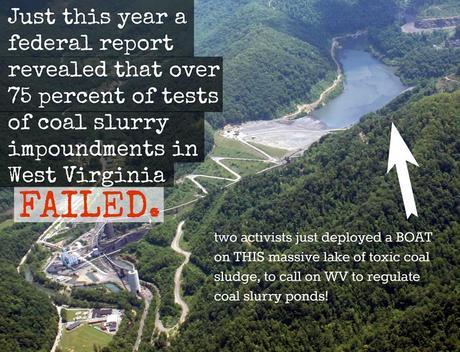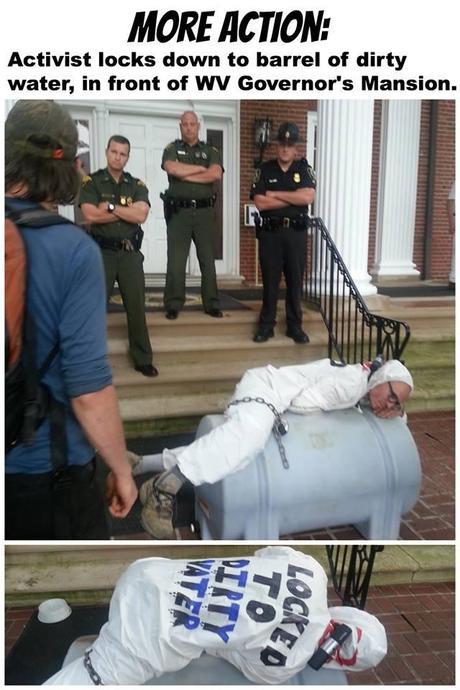From RAMPS

Charleston, W.Va. – This morning at 7:30 a.m. two activists paddled out onto the 2.8 billion gallon Shumate slurry impoundment in Raleigh County with banners reading, “Slurry Poisons Appalachia” and “Gov. Tomblin, Put Health Over Profit.” Later this morning, one activist locked himself to a barrel of black water in front of Gov. Tomblin’s mansion in a Tyvek suit reading “Locked to Dirty Water”. Activists are calling attention to the failure of the state government to protect its citizens from the abuses of the coal industry and the threats posed by coal slurry disposal.

“I grew up in Eunice drinking water poisoned by coal slurry, went to Marsh Fork Elementary under that dam, breathed the dust from that prep plant, and I’ve suffered the lifelong health consequences of that. These same abuses are taking place today across our great state, and the blame for that lies squarely at the feet of Gov. Tomblin,” said Junior Walk of Rock Creek, W.Va. who attended today’s protest at the Governor’s mansion.
Coal slurry, the toxic byproduct of “washing” impurities out of coal before it is sold, has long been a matter of deep concern for area residents. Its common disposal methods have created tragic disasters such as poisoning the public water supplies of Prenter and Eunice, W.Va., and slurry floods in Martin County, Ky., and Buffalo Creek, W.Va.. Despite this, evidence mounts that West Virginia regulators continue to fail at adequately regulating impoundments.
Just this year, two Office of Surface Mining (OSM) investigations found serious problems with the WV Department of Environmental Protection’s (DEP) oversight, both in preventing impoundments from breaking through into underground mines and ensuring proper compaction, a key measure of impoundement safety. The compaction report revealed that over 75 percent of tests of coal slurry impoundments in West Virginia failed. In February, the U.S. Department of Labor asked a federal judge to order the immediate shutdown of an impoundment in Barbour County that had not been certified by an engineer for two years, because mine operators were “flouting federal law, ignoring violations and fines, and putting the public at risk.” WVDEP had the ability to shut down this impoundment, but it didn’t until weeks after the Dept. of Labor took action.
DEP’s finances reveal its priorities. During its 2011 study of the water and health crisis in Prenter, W.Va., the DEP spent over 6 times as much money hiring a private law firm to sue EPA on behalf of the coal industry as it spent on that study. Meanwhile, Dr. Yorem Eckstein of Kent State University confirmed long held community suspicions that the well water in Prenter had been contaminated with coal slurry based on years of water quality data. Despite this evidence and extensively documented health problems including high incidence of brain tumors, DEP’s study on Prenter’s water released last year concluded that water was uncontaminated.
“Our politicians and regulators say that it’s safe to dump slurry in our communities, but they don’t want it on their doorstep. Gov. Tomblin could order to coal industry to install filter presses that would eliminate slurry while creating jobs for less than a dollar a ton,” said Chuck Nelson, retired UWMA coal miner of Glen Daniel, W.Va. “That’s the way it also goes. Our Governor puts the interests of the coal industry above the health of our communities.”
There is mounting evidence that coal’s impacts on West Virginia go far beyond coal slurry. New studies continue to document the damage to community health and water quality from out of control mining, but Gov. Tomblin continues to blindly defend the industry. Gov. Tomblin has not only ignored the evidence of the coal industry’s impacts on the health of West Virginia communities, he has also rejected calls for alternative economic development in the face of a declining coal industry. Central Appalachia is in the midst of a steep decline as predicted by many industry analysts.
“I was scared on the impoundment, but I am more terrified of the coal industry’s continued disregard for human life and land. After taking all of the coal, Alpha will abandon Appalachia in order to find other resources and communities to extract,” said Ricki Draper, one of the two activists that boated onto the sludge impoundment.


